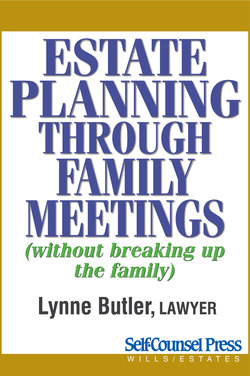Читать книгу Estate Planning Through Family Meetings - Lynne Butler - Страница 12
На сайте Литреса книга снята с продажи.
2. Not Knowing What It Will Cost
ОглавлениеMost of us have to budget for large expenses. It can be hard to make room for large, unexpected bills. Many people say they do not have wills in place and have never done proper estate planning because they believe that it will be extremely expensive. They assume that if lawyers and accountants are involved, the planning process will perhaps be so expensive as to be beyond their means.
There can be a lot of uncertainty about the cost of estate planning before things get underway. As discussed in section 1., it is not always clear what steps need to be taken. If you do not know what needs to be done, you certainly cannot estimate what it might cost.
Unfortunately, the cost of not planning can far exceed the cost of planning. When people pass away without having made a will, there can be lawsuits, delays, unnecessary tax liability, and financial losses to the estate. When people lose mental capacity without having put a power of attorney or health-care directive into place, sometimes the only way to deal with pressing issues is to make an application to the court for trusteeship or guardianship. Obviously the cost of a court application is going to far exceed what it would have cost to make a document in the first place.
Keep in mind that the emotional cost (of the turmoil and fighting over an estate) can mount even faster than the financial bills. It is very common for families to fight over estates and that is because estate arguments are about more than money; they are about emotional issues as well. If you fail to plan ahead, you are more than likely condemning your own family to a turbulent situation. It is worthwhile to at least find out the real cost of estate planning and not rely on guesses.
Using this book will help you keep costs down. First of all, it will give you quite a bit of information and background about estate planning and help you decide what exactly you should be doing. At the very least, you will be able to check off items that are already taken care of and then pinpoint those that still need attention. That will help you focus your requests, if any, to lawyers and accountants and save you the cost of spending hours with those advisors. If your lawyer or accountant does not have to spend time educating you about estate law in general, you will be able to use your meeting to zero in only on the issues that pertain to you.
This book will also help you hold a successful family meeting to talk about estate planning. That alone could save you thousands of dollars in fees for mediators or lawyers.
The following are some other practical ideas about maintaining control over costs when dealing with an estate-planning lawyer:
• Ask for a written quote before any work is done. Once you have that, make sure you understand what would cause the lawyer to exceed the quote.
• Understand how you are being billed. It is alright, in fact it is advisable, to ask questions about your costs before the work is done. For example, are you being charged by the hour or for the completed project? If it is for a completed project, make sure you understand exactly what is included. For example, does “estate planning” mean only wills, or are powers of attorney and health-care directives included in the price? Ask whether anybody else, such as paralegals or junior lawyers, will work on your file and what their billable hourly rate is. Also know what taxes will be added.
• Ask whether disbursements are extra and if so, how much they are likely to be for your file. Disbursements are out-of-pocket expenses paid by the law office, such as postage or courier fees. There might also be a set charge for faxes and photocopying.
• Ask if there is any legwork you can do yourself. For example, if the lawyer is going to search the titles to properties, you could offer to get them yourself rather than pay the lawyer to do it.
• If the lawyer calls, writes, or emails you to ask for information or documentation, or you promise to do something, respond as promptly as you can. If you delay to the point that the lawyer has to chase you down, this is likely going to cost extra.
• Understand that requesting rewrites of documents (as opposed to asking that an error made by the lawyer, such as a misspelled name, be corrected) will probably cost extra. The lawyer’s quote given at the beginning of the project is based on the average time it takes to do a project like yours, and if you keep changing your instructions so that the project changes two or three times, you will end up paying more than you were originally quoted.
• If paying a large bill all at once is a problem, ask about payment arrangements. Most law firms take credit cards. You may also be able to pay half your costs up front and the second half upon completion, or set up a payment schedule. Not all firms do this because it is risky for them, but some do, so it cannot hurt to ask.
• Keep face-to-face meetings brief and to the point. One way you can achieve this is to prepare as much as possible ahead of time. If you phone a lawyer to make your first appointment, ask what you should bring to the meeting. Make photocopies to give to the lawyer. Make notes or lists of questions to bring with you to the meeting.
